Ahead of the 80th anniversary of VE Day, our supporters and beneficiaries share their very own memories of WWII and the celebrations that took place when it ended.
Mervyn Kersh
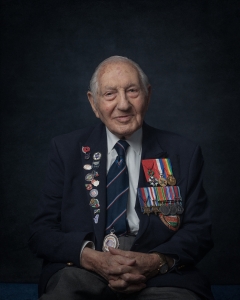
Mervyn is a beneficiary of our partner organisation, Taxi Charity for Military Veterans, which we are proud to support with regular funding.
Mervyn says:
“At the start of April 1945, Allied Forces were driving at a great speed into Germany. The war was obviously coming to its end.
I was instructed to leave my company and wait at a former ex-SS barracks in Celle in West Germany from where I would be collected and taken to Berlin to see to the disposal of Germany’s gas shells and bombs.
I was excited by this new challenge but Berlin, the heart of evil, really appealed to me. In addition the Soviet army was entering Berlin and we would meet and maybe even work together.
I was taken to Celle and awaited collection. Two weeks were to pass, and I had no idea who was supposed to pick me up, and it transpired that they had no idea where I was waiting.
My first day in Celle, I checked a map to see what could be of interest in that area and immediately saw two villages which were named Bergen and Belsen, names very familiar to me as the site of one of Germany’s concentration camps. It had been liberated five days before. and was in the hands of the Medical Corps and the Jewish Chaplain.
I left word where I could be found and went each day to the camp. I was not permitted to enter as there was widespread typhus there but I met scores of those who were able to walk outside the wired perimeter fence.
I did meet the (now) free prisoners and tried to converse in English and French. which limited speech as they had been taken from all over Europe. Nevertheless, we did make a meeting of minds, and I was able to bring whatever chocolate bars I could collect in my barracks. To see their eyes light up was a reward in itself. I did not know then that it could well have been deadly to people in their condition.
After two weeks of waiting in Celle, West Germany, I received a signal to return to the UK to prepare a new company to land on the beaches of Japan!
I admit that I had no interest in the Far Eastern War, but I also had no choice = ! had to return to UH, I was given a travel document and went to Hanover Station. There I boarded a sealed train for Bruges from where I would travel by boat to Dover and onwards to home.
The windows being boarded up was to shield the passengers from the “Werewolves”. They were German youngsters who had been given guns and told to shoot a every Allied soldier thy could. The boards were to protect us but also shut out the light. For the same reason of safety, the lights in the carriages were very dim so there was little else to do but sleep for the 36-hour journey.
During that journey the world had changed, and my fellow travellers and I had been unaware, The war in Europe had ended with Germany’s unconditional surrender and Hitler was dead. His myths had proved to be nonsense, and National Socialism had been proved false.
I arrived in Bruges one day after the surrender, so I had missed the most wonderful day in six years! People were dancing and hugging complete strangers. Some were playing musical instruments and there was an uncontrolled outpouring of relief and joy. And that was just in Bruges! I had to press on and when I finally arrived in Dover where I was supposed to spend that night, I saw a train just about to depart for London and I ran to catch it.
I finally made my way home to my family, and we all were speaking at once.”
Ken Hay MBE
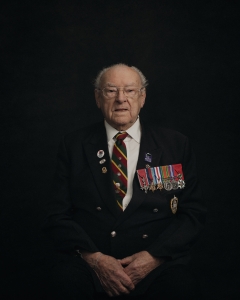
Ken is also a beneficiary of Taxi Charity for Military Veterans.
Ken says:
“VE Day and the days around it are a bit of a blur to me, but I remember some of it.
But before I must tell you, I was a prisoner of war. My brother was also in the army and we were in Normandy on night patrol. On the 8th of July 1944, I was captured but my brother got away. I was taken to a place in Poland called Katowicz to work in the coal mines.
On the 23rd of January we were told we was going to be free but were going to another camp, we walked constantly all day until we reached Bavaria on the 20th of April. We’d walk for 5 days straight, then a rest day and then walk again for another 5 days. Then we were picked up and flown home (England) on the Lancaster bomber.
VE Day was on the 8th and I arrived home (back to England) on Friday the 4th. We got to send a telegram home to our parents to say we’d be home Sunday.
Sunday morning, I got the district line to Barking station, got on the bus, and didn’t have a penny or any coins for the fare but the driver told me to get on.
Once off the bus I walked down my road “Lambourne Road”. My mum must have told everyone “Ken’s coming home Sunday!!” (even the milkman) because he ran back up our garden path and knocked on our door saying “Is this your Ken? I think he’s home!!” My 4 sisters ran out to me followed by my mum doing her best to keep up!
I was brought into the house and had a cup of tea but really wanted to get hold of my brother Bill.
I managed to send a telegram to Bill (who was still away in the army) to see if he could leave to get home because I was home and I hoped he’d get it.
On VE Day, I had so many visitors coming to see me, family, and friends, it was nice, but I was hoping to hear from my brother Bill. I remember we listened to Winston Churchill on the radio and then we went to church for Mass (as we were catholic). The service was lovely and after we headed back home. While walking we could here footsteps running behind us and a voice “Ken…. Ken…..” It was Bill! I was so happy. After talking at home, we decided we’d go to Barking and head for the park, me, my brother, and some others.
We were walking down “monkeys parade” when we heard a woman shout out “Hey soldier, give us a kiss…” It started with one kiss then there was all these women wanting to kiss us! I’ve never had so many kisses in all my life! It was great, I’ll never forget it!!” I don’t really remember much else, it’s all a blur. But those things I do remember.”
Bob

Bob lives in the Surbiton Home run by our partner organisation, Royal Star & Garter, which we are committed to supporting through regular funding.
Bob says:
“I was going to school and people were putting up flags. An old man said to me ‘it’s all finished now, you can have celebrations tomorrow’. They were putting up bunting, US flags and Union Jacks, all down the road. I put some flags around my aunt’s oak tree. I remember the VE Day parades, they were memories I will never forget. We had special lunches at school. We were allowed to dress up, there were parties in the playground. It was unforgettable.”
Stan
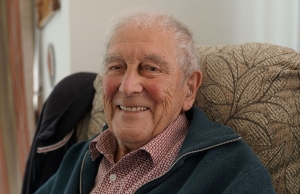
Stan is a resident of the Royal Star & Garter home in Solihull.
Stan says:
“We were in the swimming baths when someone came in and said, ‘The war’s over’. We all ran out, we never even dried ourselves!” The next day Stan cut short his celebrations after feeling unwell. He said: “In the afternoon I felt terrible, so I went in and lay down on the settee. My dad fetched a doctor and I was taken to hospital, I had diphtheria! I was delirious for a few days, and I spent 12 weeks in hospital. So I only caught the first half-day of celebrations for VE Day!”
David Wright MBE
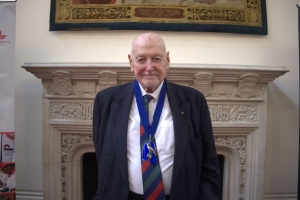
As a longstanding supporters of the Army Benevolent Fund, David pledged to leave the charity a gift in his Will.
David says:
“We marked every single moment of celebration, of course. We waved our flags on VE Day and VJ Day, but at the same time we knew the war was still going on. When it finally ended there was relief because so many people had sadly been lost, but we also wondered what was coming next.
Our memories are all we have left. It’s important to keep them alive, so we never forget the sacrifices those soldiers made and the suffering they and their families endured.”
Paul Williamson
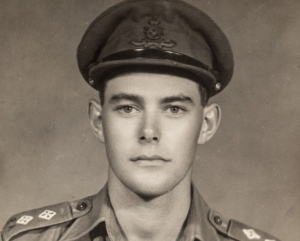
Army veteran Paul has also pledged to leave a gift in his Will to the ABF.
Paul says:
“War and its effects have shaped my life: they made me grow up and looking back I’m grateful to have been young at the time I was. Certainly, the time I spent in the military taught me understanding and tolerance, self-discipline and self-reliance.
On VE Day I went to London to celebrate and there was an enormous crush along the Embankment, like there is on New Year’s Eve when people gather to see the fireworks.
We watched the VE Victory March in Charing Cross Road feeling terribly relieved that the war was finally over and we were no longer in danger. No more of our friends would be wounded or killed. However, we were also in no doubt that we would still be living lives of hardship. Rationing remained for years after the war.”

